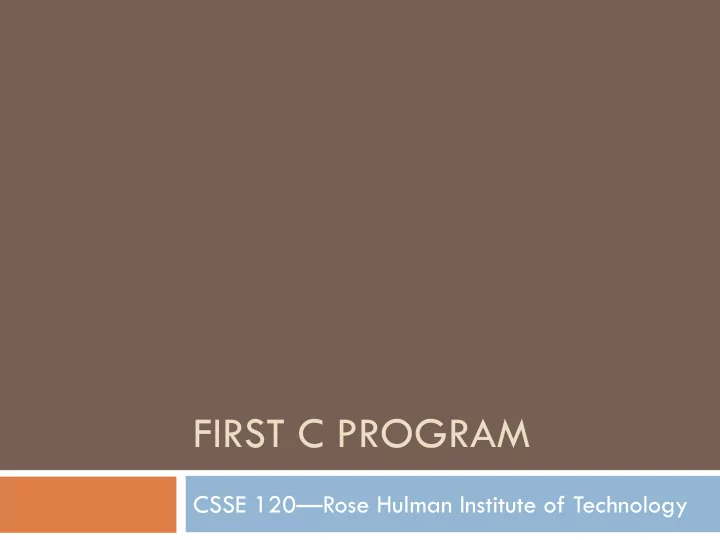

FIRST C PROGRAM CSSE 120—Rose Hulman Institute of Technology
Announcements � Exam Thursday � Optional Intro to MATLAB session � Thursday hours 1-2 in F217 � Mechanical/Biomedical Engineers who haven’t taken ME123/BE100 are strongly encouraged to attend � Homework due before the exam: � Fill out partner evaluation survey in ANGEL Lessons → Projects → Emergence → Team Project Partner Evaluation � Homework due Session 22 (Monday) � Reading in C textbook, ANGEL quiz
Reminder: C Textbook � Kochan’s “Programming in C” � Very readable, like Zelle. � Recommended highly by two non-CSSE Rose professors � First assignment and quiz due before Session 22
from math import * Parallel def printRootTable (n): examples for i in range(1,n+1): in Python print " %2d %7.3f" % (i, sqrt(i)) and C. def main (): printRootTable(10) main() #include <stdio.h> #include <math.h> void printRootTable( int n) { int i; for (i=1; i<=n; i++) { printf(" %2d %7.3f\n", i, sqrt(i)); } } int main() { printRootTable(10); return 0; }
Getting started � Create a folder directly on your C: drive, with no spaces in it, like: � C:\CProjects � File � Switch Workspace. Browse to your new folder. Go to C/C++ perspective. � New � C Project, Hello World ANSI C Project. � Call it RootTable. � Add your name to the .c file it created � Right click in margin to show line numbers � Run the project by right-clicking the PROJECT, not the file.
Comments in C � Python comments begin with # and continue until the end of the line. � C comments begin with /* and end with */ . � They can span any number of lines. � Some C compilers (including the one we are using) also allow single-line comments that begin with // .
The inclusion of header files #include is somewhat like Python's from … import * The most commonly included files are header files, whose names end with .h #include <stdio.h> angle brackets mean that it is a standard C header #include <math.h> If we include a file from our own project, surround it's name with quotes, as in #include "myFile.h" A header file usually contains definitions of constants, and function signatures (without their bodies) Two lines from math.h (we'll explain later): #define M_PI 3.14159265358979323846 double sqrt (double); Other headers: http://www.utas.edu.au/infosys/info/documentation/C/CStdLib.html
Focus on the main() Function #include <stdio.h> Every C program must have a function named main() #include <math.h> main 's return value (In this case 0) is the exit status of the program. Usually, we return 0 to indicate successful completion of the program This main( ) function has an empty formal parameter list In a function definition, we must indicate its return type before the name of a function, - In this case, int main() { the return type is int printRootTable(10); return 0; The body of a function definition is enclosed in curly braces { … } } Every simple C statement must be followed by a semicolon The two statements in the body are just like corresponding Python statements By looking at main , how can we tell that printRootTable doesn't have to return a value?
printRootTable() 's interface #include <stdio.h> What is the name of the "return type" of #include <math.h> the printRootTable() function? What does that mean? void printRootTable( int n) { The formal parameter is called n , its type is int Note that this function has no return statement. In that case, the return } type must be declared to be void The type of every formal parameter must be declared int main() { printRootTable(10); As in Python, if there are multiple formal return 0; parameters, they are separated by commas } As in Python, when printRootTable is called, the value of the actual parameter (10) is used to initialize the formal parameter (n) Notice that we do not provide the type of the actual parameter. Its type is the type of whatever value we pass in. It must "match" the type of the formal parameter
(local) variable declaration #include <stdio.h> i is a local (to the function) variable of the #include <math.h> printRootTable function void printRootTable( int n) { Its type is int int i; Unlike in Python, each C variable's and formal parameter's type } must be declared before the variable can be used int main() { Variable declarations must include a type. printRootTable(10); An optional initialization is allowed, such as return 0; int i = 17; or int i = n + 5; } A local variable cannot have the same name as a formal parameter of the same function Because the variables i and n are local to printRootTable, you cannot refer to them from anywhere else in the program
i++ � i++ is an abbreviation for i = i + 1 � which can also be written i += 1 � i-- is an abbreviation for i = i - 1 � which can also be written i -= 1 � Some C-programmers write i++ or i -- as part of a more complicated expression. � We suggest that you avoid doing that for now.
C's for loop #include <stdio.h> Basic syntax is #include <math.h> for ( <init> ; < test> ; <update> ) { void printRootTable( int n) { body int i; } for (i=1; i<=n; i++) { printf(" %2d %7.3f\n", i, sqrt(i)); } } � init : usually initializes variables used by the loop � test : if the value of the test is true, the loop body executes � update : After execution of the loop body, this code is executed. Then the test code is evaluated again, and if true …
Recommend
More recommend